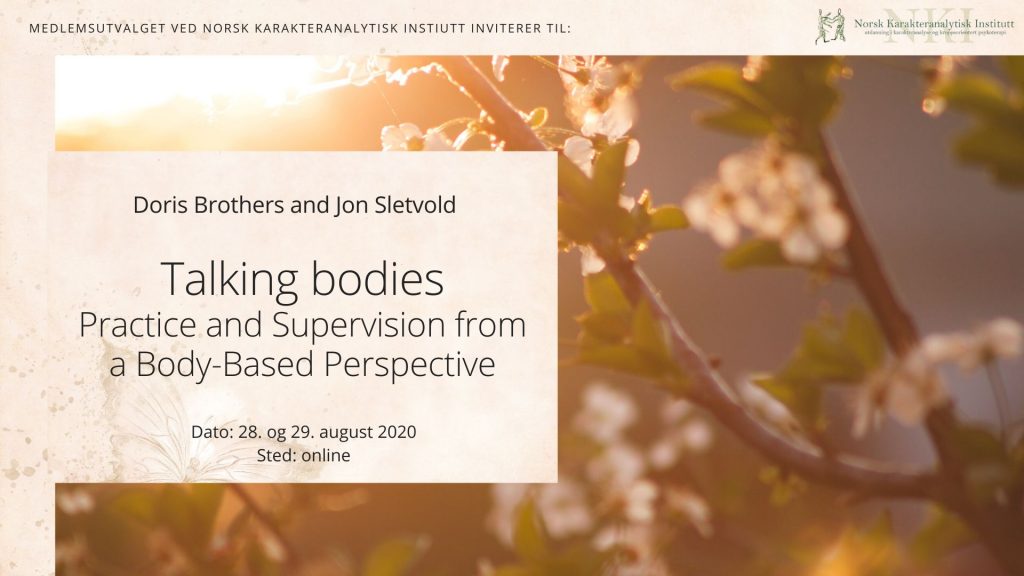Jon Sletvold and Doris Brothers
In this two-day workshop theoretical presentations will be followed by demonstrations and exercises designed to help participants explore the topics covered. They will then be invited to discuss their experiences.
Due to the corona, this workshops will take place online. You can attend from home in front of your own screen, take the opportunity to gather more participants at your home, or we will meet at the institute with a big screen.
The fee has been reduced from NOK. 4,000, – to kr. 2,000, – for each participant. The workshops will be 2 x 2 hours both days, with an hour break in between.
Those who already are registered will be able to withdraw or refund the excess if they wish to participate online.
Date: August 28-29, 2020 (from 13:00 both days)
Place: Online
Price: 2 000 kroner
Main topics:
A New Understanding of Trauma: From Dissociation-Enactment to the Fracturing of Embodied Wholeness
We will invite participants to join us in developing our understanding of traumatic experiences making use of contributions from self psychology, relational psychoanalytic theory and the work of the Boston Change Process Study Group. People who are relatively well-functioning and free from ongoing trauma tend to experience a rhythmic flow in their sensing of themselves, others, and themselves in connection to others. As we will show with clinical examples, in the aftermath of trauma this flow tends to disintegrate. We will demonstrate the benefits of using a psychotherapeutic language based on the sensing of “I,” “you,” and “we”.
The Emotional Expression of the Body: How We Perceive One Another
Our bodily appearance was at the heart of Reich´s character analytic work. Unfortunately it has become a largely neglected aspect of psychoanalytic and psychotherapeutic work. We will suggest that it is only when embodiment is a central theoretical concern that the importance of how we appear to one another becomes relevant. We will try to show that while we may imagine that we consistently perceive other peoples’ appearance in a static unchanging way, many factors alter the way we actually perceive them. We will explain that the continually changing emotional context subtly changes our perceptions of one another. Traumatic experiences often lead either to dramatic alterations in our perceptions of others or to our resolutely clinging to an unchanging perception of them.
The Patient´s Experience of the Therapist: First Meetings with Freud – and Fromm
In the hope of demonstrating the powerful impact of therapists’ bodily appearance on their patients, we will look at how two patients–The Wolf-Man and Hilda Doolittle–experienced their first meetings with Freud. While not wishing to minimize the importance of the words first exchanged by the therapeutic couple, we will try to show that their impact is largely shaped by the feelings for one another that are generated by their inter-bodily perceptions.
Embodied supervision
Attendees will get the opportunity to participate in embodied supervision exercises. The whole group will be invited to take part in the embodied supervision process.
Doris Brothers, Ph.D. is a co-founder and faculty member of the Training and Research in Intersubjective Self Psychology Foundation (TRISP). She was co-editor with Roger Frie of Psychoanalysis, Self and Context from 2015-2019 and chief editor of eForum, the online magazine of the International Association of Psychoanalytic Self Psychology (IAPSP). She serves on the advisory board and council of IAPSP. Her books include: Toward a Psychology of Uncertainty: Trauma-Centered Psychoanalysis (2008), Falling Backwards: An Exploration of Trust and Self-Experience (1995), with Richard Ulman, The Shattered Self: A Psychoanalytic Study of Trauma (1988). She is in private practice in Manhattan, New York, USA.
Jon Sletvold, Psy.D. , is a licensed specialist in clinical psychology and psychotherapy. He is founding board director and faculty member at the Norwegian Character Analytic Institute. He is co-editor with Marianne Børstad of two books: Den terapeutiske dansen [The therapeutic dance] and Karakteranalytiske dialoger [Character analytic dialogues] and the editor of Tage Philipson – Kjærlighet og identifisering [Tage Philipson – Love and Identification]. He is the author of The Embodied Analyst: From Freud and Reich to Relationality,2014, winner of the National Association for the Advancement of Psychoanalysis Gradiva Award 2015. With Per Harbitz he co-authored, 2019 Fra musklepanser til kropper i dialog – Da Reich kom til Norge og det som skjedde etterpå … [From Muscular Armor to Bodies in Dialogue – When Reich came to Norway and what happened afterwards …].
